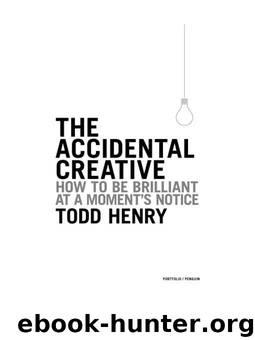The Accidental Creative: How to Be Brilliant at a Moment's Notice by Henry Todd

Author:Henry, Todd [Henry, Todd]
Language: eng
Format: mobi
Publisher: Penguin Group
Published: 2011-07-06T16:00:00+00:00
ISN’T ENERGY “RENEWABLE”?
Few of us think much about how our energy level affects our ability to create. Energy consumption is more difficult to measure than time management and other markers of productivity. Also, our energy is a renewable resource, so many of us believe that it is perfectly acceptable to race through our week until we crash, spend the weekend recovering, then start the cycle all over again.
But this mind-set is deceptive. Creative work requires that we stay ahead of our work. Tomorrow’s ideas are the result of today’s intentions. When you rely on a “just-in-time” workflow, you will quickly find it difficult to do quality work—and you’ll also find yourself lacking the drive to do anything about it.
What happens at that point? Many of us panic. If ideas aren’t flowing, we stare even more intently at the problem, pull late nights at the office, or pump ourselves full of caffeine in order to stay alert and hopefully shock our minds into generating something brilliant. This unhealthy cycle is the unfortunate reality for many creatives, and making the break from this type of lifestyle can be difficult. For some, this cycle is broken only when they lose their job or suffer some sort of mental or emotional breakdown. For others, it results in a helpless compromise, which could mean months or years of settling in and continuing to trudge along, cranking out mediocre work while feeling like they are betraying the best part of themselves. They have the energy to do only what they need to do in order to not get fired, but they have no excess energy for innovating or tackling personal creative projects.
This lifestyle and its effects on our creativity are cumulative. Creative insight is frequently the result of conceptual momentum, and the most difficult thing to do in the early stages of a project is to gain traction. Building momentum requires excess energy. When we lack the necessary energy, mobilizing around insights can be difficult. In fact, sometimes we overlook the small clues and stimuli that may yield insight because we simply lack the energy to pay attention to the nonessentials.
This is no way to live, especially when there’s something we can do about it. While I don’t believe that energy management alone is sufficient to set us up for creative brilliance, it is certainly the most neglected of the five areas of Creative Rhythm, and for many of us, energy management will require the most discipline if we want to change our habits and restructure our life in a healthy way. Striking the right balance when instilling practices around energy management will feel a little uncomfortable, perhaps even painful, at first. But experiencing the results of effective energy management makes these practices worth all the temporary discomfort.
Download
This site does not store any files on its server. We only index and link to content provided by other sites. Please contact the content providers to delete copyright contents if any and email us, we'll remove relevant links or contents immediately.
Rewire Your Anxious Brain by Catherine M. Pittman(18644)
Talking to Strangers by Malcolm Gladwell(13350)
The Art of Thinking Clearly by Rolf Dobelli(10455)
Mindhunter: Inside the FBI's Elite Serial Crime Unit by John E. Douglas & Mark Olshaker(9324)
Becoming Supernatural by Dr. Joe Dispenza(8204)
Change Your Questions, Change Your Life by Marilee Adams(7761)
Nudge - Improving Decisions about Health, Wealth, and Happiness by Thaler Sunstein(7694)
The Road Less Traveled by M. Scott Peck(7594)
The Lost Art of Listening by Michael P. Nichols(7494)
Mastermind: How to Think Like Sherlock Holmes by Maria Konnikova(7324)
Enlightenment Now: The Case for Reason, Science, Humanism, and Progress by Steven Pinker(7306)
Win Bigly by Scott Adams(7184)
The Way of Zen by Alan W. Watts(6601)
Daring Greatly by Brene Brown(6504)
Big Magic: Creative Living Beyond Fear by Elizabeth Gilbert(5756)
Grit by Angela Duckworth(5605)
Ego Is the Enemy by Ryan Holiday(5416)
Men In Love by Nancy Friday(5234)
The Laws of Human Nature by Robert Greene(5179)
